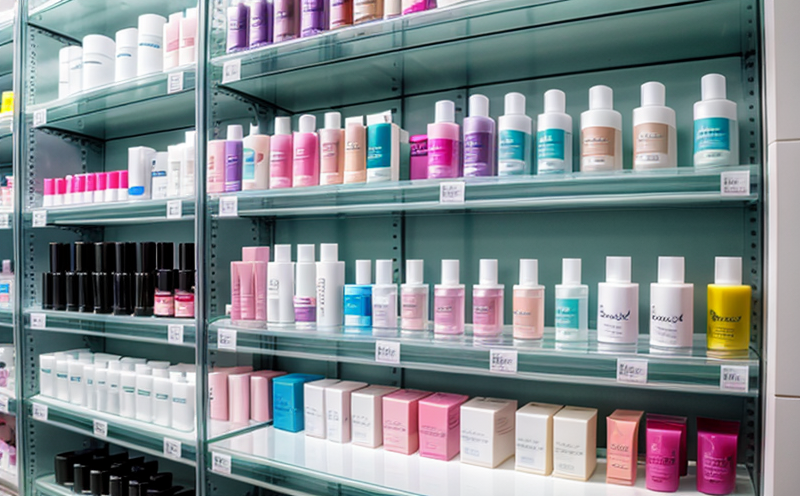Stability Testing of Sunscreen Cream Emulsions
The stability testing of sunscreen cream emulsions is a critical process that ensures the product maintains its efficacy and safety over its shelf life. This service is particularly important in the cosmetics industry, where consumers expect high performance and reliability from their products. In this context, stability testing involves assessing the physical, chemical, and microbiological changes that occur during storage under various conditions.
Sunscreen emulsions are complex systems consisting of oil-in-water or water-in-oil structures stabilized by surfactants, emulsifiers, and other ingredients. The primary goal of stability testing is to evaluate how these components interact over time and under different environmental conditions such as temperature, humidity, light exposure, and microbial contamination. This ensures that the product remains stable, effective, and safe for consumers.
The testing process typically begins with a detailed formulation review followed by preparation of test samples according to standard protocols. The stability studies are conducted at various temperatures (e.g., 40°C, 55°C) over extended periods (e.g., six months). Samples are also exposed to high humidity conditions and UV light to simulate real-world storage scenarios.
During the testing process, several key parameters are monitored:
- Physical Properties: Consistency, color, and texture changes are observed. Any significant deviations from the initial formulation can indicate instability.
- Chemical Composition: Analysis of active ingredients such as avobenzone, oxybenzone, or octinoxate to ensure they remain within acceptable limits throughout the shelf life.
- Microbial Load: Assessment of bacterial and fungal contamination levels to ensure compliance with regulatory standards.
- Skin Irritation Potential: Testing for any increased skin irritation that could arise due to chemical breakdown or microbial activity over time.
The results from these tests are crucial in determining the shelf life of the sunscreen product and ensuring it meets safety, efficacy, and stability requirements. Compliance with international standards such as ISO 28115-3:2021, ASTM F791-14, or EN 62605 provides assurance that the testing process adheres to industry best practices.
In summary, stability testing of sunscreen cream emulsions is an essential step in product development and quality control. It helps manufacturers ensure their products are safe, effective, and reliable over extended periods while meeting regulatory requirements. This service is vital for maintaining consumer trust and ensuring compliance with global standards.
Why It Matters
The importance of stability testing cannot be overstated in the context of sunscreen cream emulsions. Failure to perform thorough stability assessments can lead to several serious issues:
- Reduced Efficacy: Over time, active ingredients like avobenzone may degrade, reducing their ability to protect against UV radiation.
- Increased Skin Irritation: Chemical breakdown or microbial contamination can increase the likelihood of skin irritation and allergic reactions.
- Product Safety Concerns: Improper stability can lead to potential health risks for consumers, especially if the product contains harmful substances beyond acceptable limits.
- Regulatory Non-Compliance: Failure to meet regulatory standards can result in product recalls and legal consequences.
By conducting rigorous stability testing, manufacturers can mitigate these risks and ensure their products are safe and effective throughout the shelf life. This not only protects consumers but also enhances brand reputation and market competitiveness.
Benefits
The benefits of undergoing stability testing for sunscreen cream emulsions extend beyond mere compliance with regulations; they offer substantial advantages to manufacturers:
- Informed Product Development: Insights gained from stability tests can guide formulation adjustments, leading to improved product performance and longevity.
- Enhanced Consumer Trust: Demonstrating a commitment to quality through rigorous testing builds trust with consumers who value safety and efficacy.
- Cost Savings: Early identification of potential issues allows for corrective actions before large-scale production, reducing waste and costs.
- Streamlined Regulatory Compliance: Adherence to international standards ensures smooth navigation through regulatory approval processes.
In addition to these tangible benefits, stability testing also enhances brand reputation and customer satisfaction by delivering high-quality products that meet or exceed expectations. This is particularly important in the highly competitive cosmetics market where consumer trust plays a pivotal role.
Quality and Reliability Assurance
Ensuring quality and reliability in sunscreen cream emulsions through rigorous stability testing involves several key practices:
- Standard Operating Procedures (SOPs): Adherence to established SOPs ensures consistency and repeatability in testing methods.
- Advanced Instrumentation: Utilization of advanced analytical instruments such as high-performance liquid chromatography (HPLC) or Fourier transform infrared spectroscopy (FTIR) provides precise data on chemical composition changes.
- Comprehensive Data Analysis: Thorough analysis of all test results, including physical properties, chemical stability, and microbiological load, ensures comprehensive evaluation of product performance.
- Interdisciplinary Expertise: Leveraging expertise from various disciplines such as chemistry, biology, and engineering guarantees a holistic approach to testing.
The combination of these practices ensures that the tests conducted are not only accurate but also reliable, providing manufacturers with confidence in their product's performance. This commitment to quality and reliability is essential for maintaining high standards within the industry.





